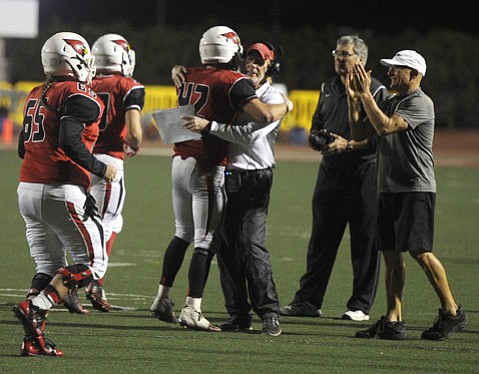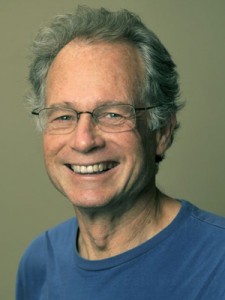
Bishop Diego football coach Tom Crawford gets a hug from linebacker Matt Shotwell after a CIF playoff victory. (Paul Wellman Photo)
I have a crush on college football. There are way too many bowl games, but at the end of the old year and beginning of the new, I will be savoring four of them: Orange (Clemson-Oklahoma), Cotton (Alabama-Michigan State), Fiesta (Notre Dame-Ohio State), and Rose (Iowa-Stanford). The former two will produce the finalists for the national championship, but there is no finer setting for the sport, championship or not, than the Rose Bowl beneath the purple majesty of the San Gabriel Mountains on New Year’s Day.
The season that preceded these matchups was full of thrills and heartbreaks, from Michigan State’s miracle finish against Michigan, to Stanford’s 30-second comeback against Notre Dame. Week to week, with championship hopes riding on every outcome, it was an emotional roller coaster. The National Football League cannot match it, but with the playoffs approaching, December does bring urgency to the NFL, as well.
.
John Zant’s column appears
each week in the
Santa Barbara Independent
Into this holiday pigskin feast drops a movie that could give football fans a kick in the head. Concussion, scheduled for release on Christmas Day, is the story of Dr. Bennet Omalu, the forensic pathologist who studied the brains of some deceased pro football players and discovered chronic traumatic encephalopathy (CTE). It is a devastating disease, suspected in dementia and depression-related suicide, that has been attributed to the years of repeated head blows the players endured. The NFL, a moneymaking machine, did not welcome the news, and Omalu had to overcome a decade of denial and disapprobation before the league owned up to its brain-injury problem.
Omalu has not limited his concerns to pro football. Last week, he set off an alarm that might sound in every American community. He penned an opinion piece that appeared in the New York Times under the headline: “Don’t Let Kids Play Football.” He maintained that children who play the sport are susceptible to CTE, and there is a moral obligation to prevent them from subjecting themselves to harm until they can decide for themselves after age 18.
It is interesting that Will Smith, who plays the crusading doctor in Concussion, was a supportive fan of high school football when his son, Trey, was a wide receiver at Oaks Christian School. The actor once landed in a helicopter near Carpinteria High to attend a junior varsity game in which his son played. Trey Smith had some college offers but opted for a career as a deejay instead.
Dr. Julian Bailes, a neurosurgeon played by Alec Baldwin in Concussion, is a colleague of Omalu but does not share his opinion about the danger of contact sports to children, who are a long way from colliding with the force of NFL players. “I’m a big believer in the benefits of organized sports and the benefits of football,” Bailes told reporters in a conference call. “I have two children who play football, and I believe football is safer than it’s ever been.”
Tom Crawford, football coach at Bishop Diego High for the past 16 years, agrees that the game has become safer. “We should be thankful they’re doing that research,” he said. “The health of our players should be paramount. The information is having an impact on the way the game is taught, officiated, and played at the high school and youth level.”
Bishop Diego has implemented safeguards based on the research. “We have limited full-speed contact drills in practice,” Crawford said. “We’ve adopted rugby-style tackling, which is shoulder-oriented and gets the head out of the way. We have a full-time trainer, Kristy Lash, who puts another set of eyes on kids at every practice and game.”
The Cardinals’ helmets offer high-tech protection. “There are sensors that keep a tally of the force of impacts and the accumulation of impacts,” Crawford said. “It goes into a computer program and alerts Christy. If the numbers are too high, we pull the kid out of practice.”
Crawford said just one of the Cardinals had a concussion this season, and he sat out two games. “We put him through a protocol,” the coach said. “It used to be that he would play as soon as he stopped showing symptoms. Now he has to be cleared by a doctor. It’s a minimum two-week process.”
The protocol applies to high school athletes throughout the area. The Santa Barbara School District has formed a partnership with Pediatric Trauma services at Cottage Hospital to evaluate and treat students in its athletic programs.
“There’s no sporting activity from which you can eliminate risk,” Crawford said. “There are any number of ways a teenager can get hurt, like falling off a skateboard. Football is a sport that challenges them physically and mentally to strive as individuals and collectively. They develop bonds and lifelong friendships. It’s hard to match that in a classroom.”
TOO MANY GAMES? Several high school football teams will have played 16 games — an NFL season’s worth and more than colleges play — when they face off in the CIF State Bowl games at Sacramento State this weekend. Among them is Camarillo, which defeated Bishop Diego 54-28 on its way to a Southern Section championship. Bishop (12-1) ended a season that equaled its longest and best, while Camarillo (15-0) continued to roll through its next two games by scores of 55-27 and 63-49.
SOCCER FINAL: UCSB played three of the four teams that reached the NCAA men’s soccer Final Four: Stanford, Akron, and Clemson, which ousted the Gauchos in the third round of the playoffs. Stanford lost to UCSB 1-0 early in the season, but it routed Clemson 4-0 in the national championship match.


